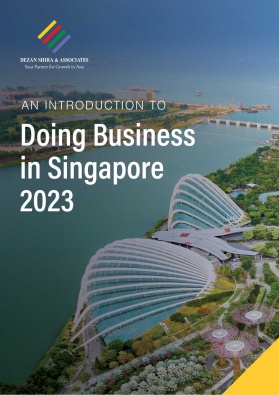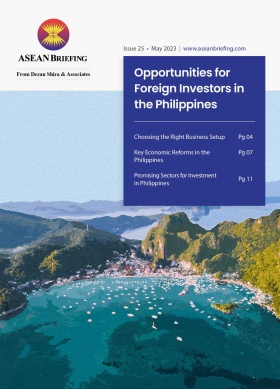Taking Advantage of Singapore’s Jurong Port Free Trade Zone: A Guide
Singapore’s Free Trade Zones (FTZs) are critical to its international trade policy as they serve as strategic hubs for global trade and investment. In particular, the Jurong Port FTZ, the largest in Singapore, offers various advantages, including duty and tax exemptions, simplified customs procedures, and efficient logistics services, as it leads to sustainability and innovation in the region.
Singapore has carved out a place on the world stage as a prominent global trade hub. Central to its success is the strategic implementation of FTZs, which stand as a critical pillar of the country’s international trade policy. These FTZs serve as powerful catalysts, attracting businesses from around the globe and positioning Singapore as a premier destination for international trade and investment.
In this article, we delve into the multifaceted nature of Singapore’s Free Trade Zones, exploring their significance, key advantages, and the major players behind their operations. We focus particularly on the Jurong Port Free Trade Zone, unveiling the opportunities it presents for businesses seeking growth, efficiency, and sustainable progress on a global scale.
Understanding Singapore’s Free Trade Zones
Singapore, a renowned trade-focused country with pro-business regulations, has established FTZs as a critical component of its international trade policy.
The Singapore Free Trade Zones can be considered an expansive network that encompasses the entire island, including key locations like the Port of Singapore and Changi Airport, alongside various designated areas.
Singapore’s FTZs, operated by three main authorities (PSA Corporation, Jurong Port, and Changi Airport Group), cover the following nine areas:
- Brani Terminal;
- Keppel District Park;
- Tanjong Pagar Terminal and Keppel Terminal;
- Sembawang Wharves;
- Pasir Panjang Wharves,
- Jurong Port;
- Changi Airport Group;
- Changi Airport Cargo Terminal Complex; and
- Airport Logistics Park of Singapore.
Key advantages
Businesses operating within these FTZs enjoy numerous advantages that facilitate seamless trade and logistics operations, including (but not limited to):
- Duty and tax exemption: One of the primary benefits of operating within a Singapore FTZ is the suspension of customs duties and taxes on goods. This exemption allows businesses to store, handle, and distribute goods without incurring additional financial burdens, enhancing cost-effectiveness and competitiveness.
- Simplified customs procedures: Singapore’s FTZs streamline customs procedures, reducing bureaucratic barriers and expediting the movement of goods.
- Efficient logistics and transportation services: The FTZs are equipped with state-of-the-art logistics and transportation infrastructure, enhancing the speed and reliability of supply chain operations. Businesses can access a wide range of logistics services, including warehousing, distribution, and transshipment facilities.
- Access to global markets: Singapore’s extensive network of free-trade agreements (FTAs), investment guarantee agreements, and Double Taxation Avoidance Agreements (DTAAs), including the India-Singapore DTAA and the Malaysia-Singapore DTAA, opens doors to markets across the globe. These agreements facilitate smooth trade relations and provide businesses with access to a vast customer base.
The Jurong Port FTZ: A gateway to Southeast Asia
The Jurong Port FTZ enjoys a prime geographic location within Singapore. Located in the dynamic Jurong Industrial Estate, the FTZ is strategically situated near key transportation hubs and major shipping routes. Its proximity to the Port of Singapore, one of the world’s busiest and most advanced container ports, enhances its connectivity and accessibility to primarily the Southeast Asian markets as well as the global markets.
Jurong Port, as the largest FTZ in Singapore and boasts 170,000 square meters of warehouse facilities, providing ample space for businesses to store and distribute goods efficiently. The port welcomes more than 15,000 vessels per year from the region and internationally. Jurong and Singapore’s other terminals handled approximately 37.3 million 20-foot equivalent units (TEUs) of containers in 2022, meaning Singapore’s ports handled the second-highest number of containers behind Shanghai. Singapore’s terminals also handled 577 million tons of cargo in 2022.
The FTZ is also near Changi Airport, Singapore’s premier aviation hub, which was ranked ninth among the world’s busiest airports in 2022. This connectivity facilitates seamless airfreight and cargo movement, providing businesses with efficient access to international markets.
Multipurpose terminals
The Jurong Port FTZ accommodates a diverse range of industries and provides a range of high-value multipurpose terminals. The port aims to become the ‘next generation multipurpose port’ meaning that the port can anticipate the changing needs and requirements of cargo and imports.
As such, the port is divided into energy terminals and multipurpose terminals. The energy terminals consist of Asia Pacific’s largest oil storage terminal while the multipurpose terminal contains terminals that handle cement and steel, each with its oedicated terminal. In addition, the port also has expertise in handling bulk cargo, such as livestock, timber, paper, rubber, and metal products.
What are the requirements for establishing a business in Singapore’s FTZs?
Entrepreneurs looking to establish companies in one of Singapore’s FTZs must adhere to specific requirements, ensuring compliance with both the companies laws and the Free Trade Zones Act.
It should be noted that companies setting up in free trade zones are commonly called free zone companies.
These zones are open to both local and foreign investors aiming to operate within Singapore. Both natural persons and corporate entities must obtain a permit from the PSA Corporation Authority before commencing operations.
For setting up a free zone company, the minimum share capital is SGD 100,000 (US$75,106.37) for companies requiring warehousing spaces and SGD 50,000 (US$37,553.18) for those in need of office spaces. The registration process for free zone companies follows similar steps to setting up a business outside these zones. Corporations intending to open free-zone companies must also submit their certificates of incorporation and the audit accounts report for the preceding financial year.
Permits and licenses
To operate within Singapore’s free trade zones, companies must secure a permit or license from one of the three authorized authorities responsible for managing the relevant FTZ, as illustrated in the table below.
|
Authorities in Charge of Singapore’s FTZs Permits and Licenses |
|
|
Authority |
Relevant FTZ area |
|
PSA Corporation Limited |
Tanjong Pagar Terminal and Keppel Terminal Sembawang Wharves Brani Terminal Keppel Distripark Keppel Distripark Linkbridge Pasir Panjang Terminal |
|
Jurong Port Pte Ltd |
Jurong Port (including Pulau Damar Laut) |
|
Changi Airport Group (Singapore) Pte Ltd |
Changi Airport Cargo Terminal Complex Airport Logistics Park of Singapore. |
There are two primary types of permits or licenses required for operating within FTZs in Singapore:
- Permits available to corporate entities; and
- Permits and licenses issued to individuals, with a short-term validity.
Application procedure
To apply for a permit, applicants must agree to comply with the relevant agency’s permit conditions, safety regulations, and security rules.
A temporary permit may be issued with a validity period ranging from 24 hours to two weeks. Corporate permits typically have a validity of one to three years and are subject to applicable fees. The processing time for either type of permit is generally not more than four days.
If you are considering applying for an FTZ permit or have inquiries related to Singapore’s free-trade zones, you can seek assistance from our experts by contacting us at asean@dezshira.com.
Webinar – Future-Proof Your Business: De-Risking Your Supply Chain in Asia
August 23, 2023 | 9:00 AM PDT / 12:00 PM EDT
In this webinar, a panel of Business Intelligence Leaders will help you understand key differences between the main markets in South / Southeast Asia and discuss their evolving supply chain ecosystems, enabling you to make informed decisions to de-risk your supply chain.
About Us
ASEAN Briefing is produced by Dezan Shira & Associates. The firm assists foreign investors throughout Asia and maintains offices throughout ASEAN, including in Singapore, Hanoi, Ho Chi Minh City, and Da Nang in Vietnam, in addition to Jakarta, in Indonesia. We also have partner firms in Malaysia, the Philippines, and Thailand as well as our practices in China and India. Please contact us at asean@dezshira.com or visit our website at www.dezshira.com.
- Previous Article Onshore Earnings Retention for Indonesian Commodity Exporters
- Next Article An Overview of Singapore’s Free Trade Agreements







